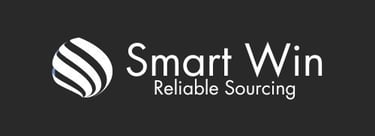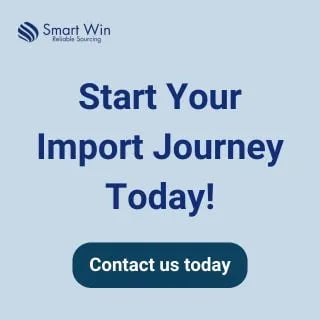[Shipping Terms Explained] Understanding FOB vs. CIF in Chinese Imports
FOB vs CIF China: Understand the key differences, costs, and responsibilities when importing goods to help you make the best shipping choice.
1/6/20259 min read
![[Shipping Terms Explained] Understanding FOB vs. CIF in Chinese Imports](https://assets.zyrosite.com/cdn-cgi/image/format=auto,w=1024,h=434,fit=crop/YNqro9jB1VIg6bzd/1202-YKbEPgjL54H6MZ8z.webp)
![[Shipping Terms Explained] Understanding FOB vs. CIF in Chinese Imports](https://assets.zyrosite.com/cdn-cgi/image/format=auto,w=375,h=366,fit=crop/YNqro9jB1VIg6bzd/1202-YKbEPgjL54H6MZ8z.webp)
When importing goods from China, understanding key shipping terms like FOB (Free on Board) and CIF (Cost, Insurance, and Freight) is crucial. These terms significantly impact cost allocation, risk management, and responsibilities between buyers and sellers.
Table of Contents
Introduction to FOB and CIF
What Are FOB and CIF?
Why Understanding These Terms Matters
FOB Explained: Responsibilities and Benefits
FOB Definition
Buyer vs. Seller Responsibilities
Pros and Cons of FOB
CIF Explained: Responsibilities and Benefits
CIF Definition
Buyer vs. Seller Responsibilities
Pros and Cons of CIF
Risk Management in FOB and CIF Shipping
Customs Clearance: Key Differences
Choosing the Right Term for Your Business
Freight Forwarders and Their Role in FOB and CIF
Other Shipping Terms You Should Know
Conclusion and Key Takeaways
Introduction to FOB and CIF
What Are FOB and CIF?
FOB (Free on Board) and CIF (Cost, Insurance, and Freight) are two of the most common shipping terms used in international trade. These terms, governed by Incoterms, define who is responsible for transportation costs, insurance, and risks during transit. Understanding these terms is essential when negotiating contracts with suppliers in China.
Why Understanding These Terms Matters
When sourcing products from China, choosing the right shipping term can mean the difference between smooth logistics and unexpected costs. For instance:
FOB gives the buyer control over the shipping process but requires more logistical coordination.
CIF provides more convenience but may include hidden costs or less comprehensive insurance coverage.
Being clear on these terms ensures a transparent relationship with your supplier and helps you budget effectively for your imports.
FOB Explained: Responsibilities and Benefits
FOB Definition
FOB stands for "Free on Board." Under this term, the seller is responsible for delivering the goods to the port of shipment and ensuring they are loaded onto the vessel. Once the goods are on board, the buyer assumes responsibility for costs, risks, and logistics.
For example, if you are importing electronics from Shenzhen, under FOB, your supplier would handle transportation to the port and loading the goods onto the ship. From there, it’s your responsibility to manage shipping, insurance, and delivery to the final destination.
Buyer vs. Seller Responsibilities
Seller Responsibilities:
Packaging the goods for shipment.
Transporting the goods to the port of shipment.
Handling export customs clearance.
Buyer Responsibilities:
Arranging freight from the port of shipment.
Insurance coverage for the goods in transit.
Import customs clearance and delivery to the final destination.
Pros and Cons of FOB
Advantages:
Cost Control: Buyers can choose their freight forwarder and negotiate better shipping rates.
Transparency: Buyers have more insight into the shipping process and costs.
Disadvantages:
Increased Responsibility: Buyers must manage more aspects of the shipping process, which can be complex for new importers.
FOB is ideal for experienced importers who want more control over their supply chain and are comfortable handling logistics.
CIF Explained: Responsibilities and Benefits
CIF Definition
CIF, or "Cost, Insurance, and Freight," is another commonly used shipping term in international trade. Under CIF, the seller takes responsibility for delivering goods to the buyer's destination port. This includes covering shipping costs, procuring insurance, and managing the risk until the goods arrive at the port.
For example, if you’re importing sport equipment from Guangzhou to Kenya under CIF, your supplier will arrange the shipping and insurance, ensuring the goods reach Mombasa Port. From there, it becomes your responsibility to handle customs clearance and inland delivery.
Buyer vs. Seller Responsibilities
Seller Responsibilities:
Packaging the goods for shipment.
Arranging freight and insurance to the destination port.
Covering risks until the goods reach the port of destination.
Buyer Responsibilities:
Customs clearance at the destination port.
Payment of import duties and taxes.
Arranging transport from the port to the final destination.
Pros and Cons of CIF
Advantages:
Convenience: The seller handles most of the logistics, making it ideal for less experienced importers.
Reduced Coordination: Buyers don’t need to negotiate freight or insurance separately.
Disadvantages:
Higher Costs: Sellers may include markups in the freight and insurance charges.
Limited Control: Buyers have less transparency over logistics and shipping arrangements.
CIF is an excellent choice for new importers or those looking for a hassle-free process, albeit at a higher cost.
Risk Management in FOB and CIF Shipping
Risk management is another crucial factor to consider when deciding between FOB and CIF.
Risks Associated with FOB
In-Transit Damage: Since the buyer assumes responsibility once goods are loaded onto the vessel, any damage during transit falls on them unless additional insurance is purchased.
Logistical Challenges: Buyers must coordinate shipping, which can be time-consuming and prone to errors.
Risks Associated with CIF
Insurance Gaps: While the seller provides insurance, it may not cover the full value of the goods or specific risks.
Limited Control: Buyers cannot ensure that the shipping and insurance terms are optimal.
Mitigating Risks
For FOB shipments, work with a reliable freight forwarder to ensure smooth transit and purchase comprehensive insurance.
For CIF shipments, verify the seller’s insurance policy details and request additional coverage if necessary.
Customs Clearance: Key Differences Between FOB and CIF
Customs clearance processes differ based on whether you opt for FOB or CIF.
FOB Customs Responsibilities
The buyer is responsible for import customs clearance.
Buyers must handle the documentation and pay duties and taxes.
CIF Customs Responsibilities
Similar to FOB, the buyer manages import customs clearance.
The seller ensures the goods arrive at the port, but further responsibilities lie with the buyer.
Pro Tips for Smooth Customs Clearance
Stay Organized: Maintain clear documentation, including bills of lading, commercial invoices, and packing lists.
Hire a Customs Broker: Especially for FOB shipments, where the buyer manages more responsibilities.
Choosing the Right Shipping Terms for Your Business
When deciding between FOB and CIF, several factors should guide your decision. Below, we discuss key considerations to help you choose the best shipping term based on your specific business needs.
Factors to Consider When Choosing Between FOB and CIF
Control Over the Shipping Process:
FOB gives the buyer more control over the logistics, allowing you to choose your freight forwarder, negotiate shipping rates, and manage insurance policies directly. This is ideal for businesses with established supply chains or experience in logistics.
CIF is more suited for businesses that prefer convenience. Since the seller handles most of the logistics, you’ll have less control but will save time and effort in organizing shipment details.
Experience with Importing:
If you're new to importing or unfamiliar with shipping logistics, CIF may be the easier and safer choice. The seller takes on most of the responsibilities, making it less likely for you to encounter costly or unexpected issues during shipping.
FOB is better suited for experienced importers who want to manage the shipping process and ensure the best prices and coverage.
Budget and Cost Considerations:
FOB may offer a better cost advantage because the buyer can choose a cheaper freight forwarder and better insurance policies. However, the buyer must handle the shipping process, which can add hidden costs if not managed properly.
CIF may be more expensive because the seller includes the freight and insurance costs in the total price. However, this price might be convenient for businesses that prefer predictable costs.
Geographical Location:
For businesses importing to regions with less developed infrastructure (such as parts of Africa or the Middle East), CIF might reduce the headaches of navigating local shipping logistics. In contrast, FOB might require more effort on the buyer’s part to ensure smooth operations after the goods arrive.
Case Study: FOB vs. CIF for African Importers
Let’s consider a company in Kenya looking to import electronic goods from China.
FOB: The buyer arranges the shipment from Shenzhen to Mombasa and hires a local freight forwarder to handle customs clearance and inland transport. They have the flexibility to negotiate rates but take on the risk of any issues during transit. If the goods are damaged during the journey, they are responsible.
CIF: The seller arranges everything, including freight and insurance, and the goods are shipped directly to Mombasa. The buyer doesn't have to worry about shipping or insurance, but they will likely pay a higher price than they would with FOB. However, this price includes all costs up to the destination port, which can be helpful for budgeting.
When to Consider Alternative Terms
While FOB and CIF are the two most commonly used terms, there are other incoterms that might be more suitable depending on your situation. For example:
EXW (Ex Works): The seller’s responsibility ends when the goods are made available for pickup at their premises. This term is ideal for buyers who want full control over the shipping process, but it also places more responsibility on them.
DDP (Delivered Duty Paid): The seller is responsible for shipping and delivering goods to the buyer’s door, covering all costs, including customs duties and taxes. This is the most seller-favorable term, offering the buyer a hands-off experience.
Customizing Shipping Terms
Sometimes, a hybrid approach might work best for your business. It’s possible to negotiate specific terms with suppliers, like having the seller handle shipping but leaving the buyer in charge of insurance. The key is clear communication with your supplier and freight forwarder to ensure that both parties are on the same page regarding responsibilities and risks.
The Role of Freight Forwarders in FOB and CIF Transactions
A freight forwarder plays a critical role in both FOB and CIF transactions. They act as intermediaries, helping businesses navigate the complexities of international shipping. Here’s how they assist in each scenario:
Freight Forwarders for FOB Shipments
In an FOB arrangement, the buyer assumes most of the responsibility for shipping. However, a freight forwarder can offer significant assistance by:
Helping to arrange shipping from the Chinese port to the destination port.
Negotiating favorable shipping rates.
Coordinating inland transportation and customs clearance at the destination port.
Offering advice on insurance policies and how to manage risk.
Freight Forwarders for CIF Shipments
Though the seller takes on more responsibility under CIF, freight forwarders still play a key role:
Ensuring the shipment is booked and insured properly.
Coordinating the delivery from the seller’s port to the buyer’s port.
Handling customs clearance at the destination port, even though the buyer is technically responsible.
Choosing the Right Freight Forwarder
Selecting the right freight forwarder is crucial for both FOB and CIF shipments. Consider the following when making your choice:
Experience: Look for a freight forwarder with experience handling shipments from China to your destination country.
Reputation: Choose a forwarder with a proven track record of reliability and professionalism.
Flexibility: Ensure they can adapt to your specific needs, whether you are handling customs clearance yourself or working with a CIF arrangement.
Final Thoughts: Selecting FOB or CIF for Your Business
Understanding the nuances of FOB and CIF is essential for making informed decisions about your shipping and import strategy. Both terms offer distinct advantages depending on your priorities:
FOB allows you to have more control over your shipping costs and logistics, but it also places more responsibility on you, the buyer.
CIF provides convenience by bundling costs, but it might be less cost-efficient and limit your control over the shipping process.
The key is to assess your business’s needs, your experience with shipping logistics, and your willingness to manage risks and costs. If you’re new to international shipping, CIF might be a good starting point. However, for businesses looking to optimize costs and have more control, FOB offers greater flexibility.
Whichever you choose, it's important to communicate clearly with your suppliers, freight forwarders, and any other partners involved to ensure a smooth and successful import process.
Stay proactive, plan ahead, and monitor your shipments closely. By doing so, you can minimize delays, reduce costs, and ensure smooth operations for your business. Hiring a China sourcing agent like Smart Win can help you to smooth your sourcing process from searching for suppliers to managing shipping.
Additional Resources
If you’re interested in learning more about shipping terms, FOB, CIF, or other international trade best practices, check out some of these additional resources:
By leveraging these resources and building solid relationships with reliable partners, you can streamline your international shipping and improve your overall business efficiency.
FAQs:
1. What happens if there’s damage to the goods during transit under FOB or CIF?
Under FOB, the buyer assumes responsibility for the goods once they are loaded onto the vessel at the port of departure. Therefore, any damage during transit is typically the buyer's responsibility. For CIF, the seller covers the cost of insurance, so if the goods are damaged during transit, the buyer can file an insurance claim with the shipping company to recover the cost of the damaged goods.
2. Can I switch from FOB to CIF after negotiating with the supplier?
Yes, it is possible to change the shipping term from FOB to CIF after initial negotiations, but it requires a new agreement between the buyer and the seller. Both parties need to agree to the new terms, and the cost may change as a result of the seller taking on more responsibility (e.g., insurance, freight costs). Always make sure this change is reflected in the contract.
3. Who is responsible for handling the customs duties and taxes under FOB and CIF?
Under FOB, the buyer is responsible for the customs duties and taxes at the destination port since the goods are transferred to the buyer once they are loaded onto the ship.
Under CIF, while the seller covers the cost of shipping and insurance, the buyer typically still handles customs duties and taxes once the goods arrive at the destination port. The seller only covers the costs of clearing the goods through customs at the point of departure.
4. How does the risk of delays differ between FOB and CIF?
In an FOB arrangement, the risk of delays is largely transferred to the buyer once the goods are loaded onto the ship. If there are any delays during transit or upon arrival at the destination port, the buyer or the freight forwarder is responsible for managing and resolving these issues. With CIF, the seller assumes more responsibility, which can sometimes reduce the buyer's exposure to delays, as the seller manages shipping and insurance.
5. How can I ensure my goods are insured properly under FOB?
If you're using FOB, you should arrange insurance for the goods yourself once they are loaded onto the vessel. Speak with your freight forwarder or insurance provider to select the right type of insurance that covers the full value of the goods during transit. Be sure to understand the terms of the insurance policy, including what is covered and the claims process, to protect your investment.
Our Address
No.202 Huanshi West Rd, Yuexiu District Guangzhou, China
Contact Us
Working hours
Monday - Saturday
9:00 - 18:00
( Beijing Standard Time )
Smart Win Services


Company




